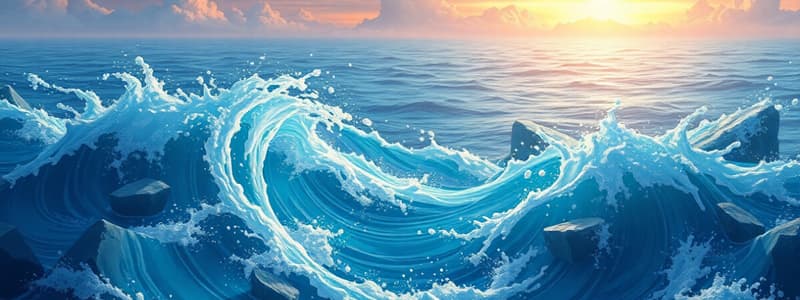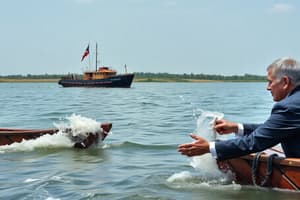Podcast
Questions and Answers
What role do Non-Governmental Organizations (NGOs) and Transnational Companies (TNCs) play in the diplomatic realm?
What role do Non-Governmental Organizations (NGOs) and Transnational Companies (TNCs) play in the diplomatic realm?
- They operate solely through collaborative teamwork.
- They primarily rely on hard power techniques.
- They completely reject the norms of traditional diplomacy.
- They mimic traditional diplomatic norms but introduce new dynamics. (correct)
What is indicated as a central aspect of diplomacy in the discussed context?
What is indicated as a central aspect of diplomacy in the discussed context?
- The necessity of maintaining a bystander position.
- The avoidance of collaboration between states.
- The understanding and mobilization of power. (correct)
- Adherence to traditional diplomatic protocols.
Why is the current discourse on hydrodiplomacy considered lacking?
Why is the current discourse on hydrodiplomacy considered lacking?
- It presents unrealistic definitions that only focus on soft power.
- It often ignores the concept of hard power. (correct)
- It emphasizes the dominance of collaborative peacebuilding.
- It primarily discusses internal political dynamics within states.
What might diminish the effectiveness of addressing water-related conflicts?
What might diminish the effectiveness of addressing water-related conflicts?
What does the term 'power gap' in hydro-politics refer to?
What does the term 'power gap' in hydro-politics refer to?
What is a primary concern for downstreamers when upstreamers harness rivers for infrastructural works?
What is a primary concern for downstreamers when upstreamers harness rivers for infrastructural works?
What challenge for hydrodiplomacy involves building trust among competing stakeholders?
What challenge for hydrodiplomacy involves building trust among competing stakeholders?
What is the primary focus of hydrodiplomacy as suggested in the content?
What is the primary focus of hydrodiplomacy as suggested in the content?
Which of the following has been noted as an advantage for downstreamers like the Netherlands?
Which of the following has been noted as an advantage for downstreamers like the Netherlands?
What does Warner (1992) suggest about the relationship between upstreamers and downstreamers?
What does Warner (1992) suggest about the relationship between upstreamers and downstreamers?
Which theory emphasizes the role of sub-state actors in international relations?
Which theory emphasizes the role of sub-state actors in international relations?
Which challenge emphasizes the need for sustainable funding in transboundary water cooperation?
Which challenge emphasizes the need for sustainable funding in transboundary water cooperation?
According to Jan Eliasson, what is occurring with hydrodiplomacy in contemporary discussions?
According to Jan Eliasson, what is occurring with hydrodiplomacy in contemporary discussions?
What significant transition occurred in the hydro-political literature following the 1990s?
What significant transition occurred in the hydro-political literature following the 1990s?
What characterizes the geographical context of transboundary rivers and lakes around the world?
What characterizes the geographical context of transboundary rivers and lakes around the world?
Flashcards
Diplomatic Style
Diplomatic Style
Diplomatic style refers to the approach and tactics used by actors in international relations, influenced by factors like national identity, strategic context, and the nature of their counterparts.
Power in Diplomacy
Power in Diplomacy
In diplomacy, power is the ability to influence others, achieve desired outcomes, and shape the course of events. It is central to understanding diplomatic interactions and outcomes.
Power Gap in Water Diplomacy
Power Gap in Water Diplomacy
The 'power gap' in water diplomacy refers to the inadequate attention and analysis given to the role of power in resolving transboundary water disputes.
Hard Power
Hard Power
Signup and view all the flashcards
Soft Power
Soft Power
Signup and view all the flashcards
Two-level game
Two-level game
Signup and view all the flashcards
Multitrack Diplomacy
Multitrack Diplomacy
Signup and view all the flashcards
Hydrodiplomacy
Hydrodiplomacy
Signup and view all the flashcards
Paradiplomacy
Paradiplomacy
Signup and view all the flashcards
Water Peace
Water Peace
Signup and view all the flashcards
Water as a Geopolitical Resource
Water as a Geopolitical Resource
Signup and view all the flashcards
Upstream Advantage
Upstream Advantage
Signup and view all the flashcards
Upstream vs. Downstream Power Dynamics
Upstream vs. Downstream Power Dynamics
Signup and view all the flashcards
Multi-actor Policy Environment
Multi-actor Policy Environment
Signup and view all the flashcards
Study Notes
Hydrodiplomacy: Powering Water Conflict Dynamics
- The study argues that existing hydrodiplomacy literature overlooks the crucial role of power.
- Hydrodiplomacy needs a blend of hard power (coercion) and soft power (persuasion).
- Different negotiation styles exist, based on the use of diverse power resources.
- Four International Relations theories (Realism, Institutionalism, Constructivism, and Critical theory) provide valuable insights into power utilization in diplomacy.
- A transboundary water conflict example (Scheldt River between Netherlands and Belgium) showcases the interplay of different power dynamics, emphasizing the influence of back tables, public movements, and crisis-driven decisions.
- The Yemeni irrigation system case highlights how institutions and arguments might not always prevail against diverse power sources.
- Emphasizes that a focus on institutions alone doesn't fully explain hydrodiplomacy.
- Different power sources (realist, institutionalist, constructivist, critical) and negotiation styles are important in diplomatic interactions.
- Power resources, organisational culture, negotiation arena and home base inform negotiation style.
- Classical state diplomacy coexists with network-based diplomacy. Recent approaches involve multiple actors like NGOs and TNCs influencing negotiations.
Power Resources in Diplomacy
- Power isn't just soft; hard power is vital and can be used in combination with soft power.
- Analyzing different power resources (coercion, inducements, authority, expertise) provides a more thorough understanding.
- Diplomacy's ability to mediate conflicts reflects its crucial role in international relations.
Negotiation Styles & International Relations Theories
- Realism: Diplomacy as a tool for achieving state aims in an anarchic world. Power asymmetry is considered productive, and game theory helps predict outcomes.
- Institutionalism: Diplomacy builds trust, value, and linkages for collective action, promoting cooperation and stability despite power differences.
- Constructivism: Diplomacy is a social interaction centered around identity and shared perceptions. Ideas, knowledge, and shared understanding can resolve conflicts.
- Critical theory: Diplomacy must acknowledge and resist power inequality. It highlights how power structures influence outcomes, especially for marginalized groups.
- The study suggests that considering diverse theoretical perspectives enhances understanding of hydrodiplomacy.
- Incorporates 'time/timing' (path dependency, uncertainty, etc.) as crucial factors in hydrodiplomatic strategies.
Case Studies
- Scheldt River: Negotiation dynamics between the Netherlands and Belgium demonstrate a shift from purely realist power plays to institution building through co-operation.
- Yemen Irrigation System: The Yemeni case showed how institutional reforms and persuasive arguments didn't always prevail amidst power dynamics and pre-existing conflicts. The case study also highlighted that institutions are not always enough and diverse power resources matters.
Additional Notes
- The study suggests a framework that combines insights from IR theory and power typology.
- This framework, by highlighting 'powering' alongside 'puzzling' (understanding) diplomacy, offers a structured approach to analyzing water conflicts.
- Hydrodiplomacy, particularly regarding shared water resources, is becoming increasingly complex due to the expanding role of non-state actors.
- The study aims to enhance the analytical tools of hydrodiplomacy by considering a wider range of power dynamics.
Studying That Suits You
Use AI to generate personalized quizzes and flashcards to suit your learning preferences.


